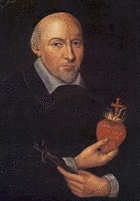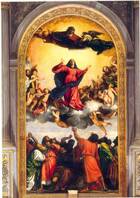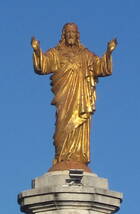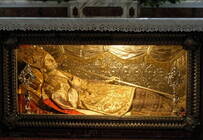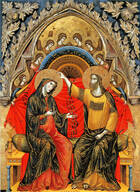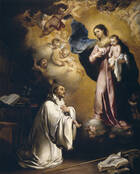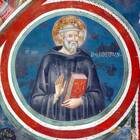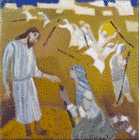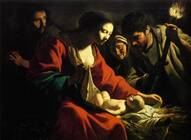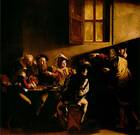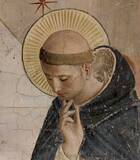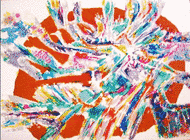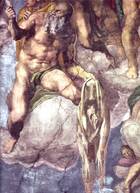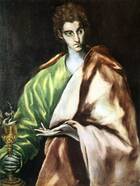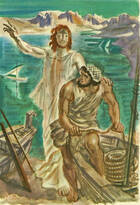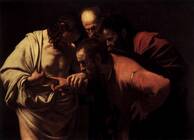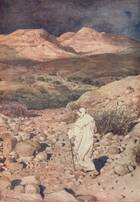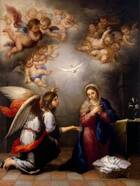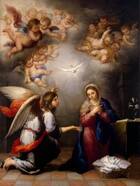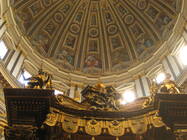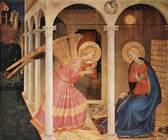Catechesis with Benedict XVI
During his papacy, Papa Benedetto taught, guided and encouraged the universal Church with his beautiful, both simple and profound, weekly catechesis. Begun in the Year of Faith in deep gratitude to Joseph Ratzinger for being such a Holy Father to us all, this podcast only includes a smattering from the series of BXVI's catecheses on: The Psalms & Canticles at Vespers (continuing on from where St JPII stopped), The Apostles, Saint Paul, The Church Fathers, The Saints, Prayer, & Faith and the Creed
You can see a list of all BXVI's catechesis in chronological order here & a summary of the podcast episodes so far by category: the Year of Faith, Our Lady, the Apostles, the Saints & the School of Prayer. To read the full text of each catechesis, click on the blue titles or on the pics.
Many thanks to Ooberfuse and Fr Rob Galea for the gift of their music: Catechesis in the Year of Faith - Credo by Ooberfuse; Catechesis on the Saints - To the Ends of the Earth by Fr Rob Galea - ℗ 2011 Robert Galea - used with permission. You can subscribe to this Totus2us podcast on Spotify, here on iTunes or here on the RSS feed. Plus you can download the free mp3 audio recordings individually by right/double clicking on the blue play buttons.
St John Eudes 
"In the context of the Year for Priests, it is in my heart to pause to underline the apostolic zeal of St John Eudes, particularly directed to the formation of diocesan clergy. The saints are the true interpretation of Sacred Scripture. The saints have verified, in the experience of life, the truth of the Gospel; thus they introduce us into knowing and understanding the Gospel. The Council of Trent, in 1563, had issued norms for the erection of diocesan seminaries and for the formation of priests, as the Council was well aware that the whole crisis of the reform was also conditioned by an insufficient formation of priests, who were not prepared for the priesthood in a just way, intellectually and spiritually, in the heart and soul. This was in 1563; but since the application and realization of the norms were delayed both in Germany and in France, St John Eudes saw the consequences of this lack. Moved by a lucid awareness of the grave need for spiritual help, in which souls lay precisely because of the inadequacy of the majority of the clergy, the saint, who was a parish priest, established a Congregation dedicated in a specific way to the formation of priests. In the university town of Caen he founded his first seminary, an experience highly appreciated, which very soon extended to other dioceses. The pathway of holiness, which he traveled and proposed to his followers, had as its foundation a solid trust in the love that God has revealed to humanity in the priestly Heart of Christ and in the maternal Heart of Mary. In that time of cruelty, of loss of interiority, he turned to the heart with the line of the prophetic word (Is 46, 8): Redite, praevaricatores, ad cor - often commented on by St Augustine. He wanted to recall people, men and women and above all future priests to the heart, by showing the priestly Heart of Christ and the maternal Heart of Mary. Every priest must be witness and apostle of this love of the heart of Christ and of Mary."
Meditation 
La Meditazione 
"She, who “believed” in the announcement of the Angel and made herself instrument so that the eternal Word of the Most High could be incarnated, also welcomed in her heart the wonderful prodigy of the human-divine birth, she meditated on it, she paused in reflection on what God was working in her, so as to welcome the divine will in her life and respond to it. The mystery of the incarnation of the Son of God and of Mary’s motherhood is so great that it requires a process of interiorization, it is not only something physical that God works in her, but is something that demands an interiorization on the part of Mary, who seeks to deepen its intelligence, to interpret its meaning, to understand its aspects and implications. Thus, day after day, in the silence of ordinary life, Mary continued to keep in her heart the successive marvellous events of which she was witness, all the way to the extreme test of the Cross and the glory of the Resurrection. Mary fully lived her existence, her daily duties, her mission as mother, but she knew how to maintain within herself an inner space to reflect on the word and will of God, on what was happening in her, on the mysteries of the life of her Son."
The Assumption of the Blessed Virgin Mary 
L’Assunzione della Beata Vergine Maria 
BXVI: "Since the first centuries of Christianity, this feast has always been deeply felt by the Christian people; as is well known, it celebrates the glorification, also bodily, of that creature whom God chose as Mother and whom Jesus on the Cross gave as Mother to all humanity. The Assumption evokes a mystery that interests each one of us because, as the Second Vatican Council affirms, Mary "shines here below as sign of sure hope and consolation for the people of God who are on the pathway" (Lumen Gentium, 68). However, we are so caught up in the events of each day as to sometimes forget this consoling spiritual reality, which constitutes an important truth of faith.
How then can we make this luminous sign of hope be perceived more and more by all of us and by today's society? There are those today who live as if they would never have to die or as is everything must end with death; others, holding that man is the unique architect of his own destiny, behave as if God did not exist, sometimes even going so far as to deny that there is room for Him in our world. The great successes of technology and science, which have considerably improved humanity's condition, leave unsolved however the deepest questions of the human soul. Only openness to the mystery of God, who is Love, can quench the thirst for truth and happiness in our hearts; only the prospect of eternity can give authentic value to historical events and above all to the mystery of human fragility, of suffering and of death."
God Reveals His Design of Benevolence 
Dio rivela il suo "disegno di benevolenza" 
"This “design of benevolence” did not remain, so to speak, in the silence of God, in the heights of his Heaven, but He made it known by entering into relationship with man, to whom He revealed not only something, but His very self. He did not simply communicate a set of truths, but communicated himself to us, all the way to being one of us, to being incarnated. The Second Vatican Ecumenical Council says in the Dogmatic Constitution Dei Verbum: “It pleased God in his goodness and wisdom to reveal his very self [not only something of himself, but he himself] and to make known the mystery of his will, thanks to which men through Christ, the Word made flesh, have access in the Holy Spirit to the Father and are thus rendered participants in the divine nature” (DV, 2). God does not only say something, but He communicates Himself, He attracts us into divine nature in such a way that we are involved in divine nature, divinized. God reveals his great design of love by entering into relationship with man, by coming so close to him as to make Himself man. The Council continues: “The invisible God in his great love speaks to men as to friends (cf Ex 33, 11; Jn 15, 14-15), and lives among them (cf Bar 3, 38) so as to invite and admit them into communion with Himself” (ibid). With only his intelligence and capabilities man could not have reached such a luminous revelation of God’s love; it is God who has opened his Heaven and lowered Himself so as to guide man in the abyss of his love."
St Alphonsus Liguori & Prayer 
Sant'Alfonso Maria de' Liguori e la preghiera 
BXVI: "St Alphonsus describes prayer as “the necessary and safe means of obtaining salvation and all the graces we need to attain it”. In this sentence is summarized the Alphonsian way of understanding prayer.
First of all, by saying that it is a means, he reminds us of the end to be reached: God created out of love, so as to be able to give us life in fullness; but this goal, this life in fullness, because of sin has, so to speak, become distant — we all know it — and only God’s grace can render it accessible. So as to explain this basic truth and to make it understood with immediacy how real the risk of “being lost” is for man, St Alphonsus had coined a famous, very elementary maxim, which says: “The one who prays is saved, the one who does not pray is damned!”. To comment on this lapidary phrase, he added, “In conclusion, to save oneself without praying is most difficult, even impossible... but praying to save oneself is a sure and easy thing” (II, Conclusion). And he says further: “if we do not pray, we have no excuse, because the grace to pray is given to everyone... if we do not save ourselves, all the fault will be ours, because we will have not prayed” (ibid). Thus by saying that prayer is a necessary means, St Alphonsus wanted it to be understood that in every situation of life one cannot do without praying, especially in moments of trial and difficulty. We must always knock with trust at the door of the Lord, knowing that in everything He takes care of his children, of us. For this reason, we are invited not to be afraid to turn to Him and to present our requests to Him with trust, in the certainty of obtaining that which we need.
Dear friends, this is the central question: what is really necessary in my life? I respond with St Alphonsus: “Health and all the graces that we need for that” (ibid); naturally, he means not only the health of the body, but above all that of the soul, which Jesus gives us. More than anything else we need his liberating presence which renders our existence truly fully human and hence full of joy. And only through prayer can we welcome Him, his Grace, which, by illuminating us in every situation, makes us discern the true good and, by strengthening us, also renders our will efficacious, that is, renders it capable of carrying out the known good. We often recognize the good but are not capable of doing it. With prayer we come to accomplish/arrive at accomplishing it. The Lord's disciple knows he is always exposed to temptation and never fails to ask in prayer for God’s help, so as to overcome it."
St Alfonso Maria de' Liguori 
BXVI: "St Alphonsus, above all in his main work entitled Moral Theology, proposes a balanced and convincing synthesis between the demands of God’s law, engraved on our hearts, fully revealed by Christ and authoritatively interpreted by the Church, and the dynamics of man's conscience and freedom, which precisely in adherence to truth and goodness allow the maturation and realization of the person. Alphonsus recommended to pastors of souls and to confessors that they be faithful to Catholic moral doctrine, while at the same time assuming a charitable, understanding, sweet attitude so that penitents could feel accompanied, supported, encouraged on their pathway of faith and Christian life. St Alphonsus never tired of repeating that priests are a visible sign of the infinite mercy of God, who forgives and illuminates the mind and heart of the sinner so that he may be converted and change his life. In our epoch, in which there are clear signs of the loss of moral conscience and — it must be recognized — of a certain lack of esteem for the Sacrament of Confession, St Alphonsus’ teaching is still of great actuality.
.. Among the forms of prayer fervently recommended by St Alphonsus stands out the visit to the Most Holy Sacrament or, as we would say today, adoration, brief or prolonged, personal or as a community, before the Eucharist. “Certainly” - writes Alphonsus - “amongst all devotions that of adoring Jesus in the Blessed Sacrament is the first after the sacraments, the dearest to God and the most useful to us… Oh, what beautiful delight to stay before an altar with faith… and to present ones needs to him, as a friend does to another friend in whom one has full confidence!” (Visits to the Blessed Sacrament and to the Blessed Virgin Mary for each day of the month. Introduction). Alphonsian spirituality is in fact eminently Christological, centred on Christ and His Gospel. Meditation on the mystery of the Incarnation and the Passion of the Lord are frequently the subject of his preaching. In these events, in fact, the Redemption is offered “copiously” to all men and women. And precisely because it is Christological, Alphonsian piety is also exquisitely Marian. Deeply devoted to Mary, he illustrates her role in the history of salvation: associate in the Redemption and Mediatrix of grace, Mother, Advocate and Queen. Furthermore, St Alphonsus affirms that devotion to Mary will be of great comfort to us at the moment of our death. He was convinced that meditation on our eternal destiny, on our call to participate for ever in the beatitude of God, as well as on the tragic possibility of damnation, contributes to living with serenity and commitment, and to facing the reality of death, always retaining all trust in the goodness of God."
Commemoration of all the faithful departed 
BXVI: "Dear friends, the solemnity of All Saints and the Commemoration of all the faithful departed tell us that only the one who can recognize a great hope in death can also live a life starting from hope. If we reduce man exclusively to his horizontal dimension, to that which can be perceived empirically, life itself loses its profound meaning. Man needs eternity and every other hope is too brief, too limited for him. Man is only explainable if there is a Love that overcomes every isolation, even that of death, in a totality that transcends even space and time. Man is explainable, he finds his deepest meaning, only if there is God. And we know that God came out of his distance and made himself close, entered into our life and tells us: “I am the resurrection and the life; he who believes in me, even if he dies he shall live; whoever lives and believes in me will never die” (Jn 11, 25-26).
Let us for a moment think of the scene of Calvary and let us listen again to the words that Jesus, from the height of the Cross, addresses to the wrongdoer crucified on his right: “In truth, I say to you, today you will be with me in paradise” (Lk 23, 43). Let us think of the two disciples on the road to Emmaus, when, after having travelled a stretch of the road with the Risen Jesus, they recognize him and without delay leave for Jerusalem to announce the Resurrection of the Lord (cf Lk 24, 13-35). The Master's words come back to mind with renewed clarity: “Do not let your hearts be troubled. Have faith in God and have faith also in me. In my Father’s house there are many rooms; if there were not, I would have told you so; I am going to prepare a place for you” (Jn 14, 1-2). God has truly shown himself, has become accessible, has so loved the world “that he gave his only begotten Son, that whoever believes in him may not be lost but may have eternal life” (Jn 3, 16), and in the supreme act of love of the Cross, immersing himself in the abyss of death, he has conquered it, he has risen and opened the gates of eternity also to us. Christ sustains us through the night of death which He himself has traversed; he is the Good Shepherd, to whose guidance we can entrust ourselves without any fear, because He knows the road well, even through the darkness."
Mary, Queen 
Beata Vergine Maria Regina 
BXVI: "This is the root of today’s feast: Mary is Queen because she is associated in a unique way to her Son, both on the earthly pathway and in the glory of Heaven. The great saint of Syria, Ephrem the Syrian, affirms, concerning the royalty of Mary, that it derives from her motherhood: she is Mother of the Lord, of the King of kings (cf Is 9, 1-6) and shows us Jesus as our life, salvation and hope. The Servant of God Paul VI recalled in his apostolic exhortation Marialis Cultus: “In the Virgin Mary everything is relative to Christ and everything depends on him: it is for him that God the Father, from all eternity, has chosen her as all holy Mother and has adorned her with gifts of the Spirit, granted to no one else” (n 25).
But now let us ask ourselves: what does Mary Queen mean? Is it only a title united to others, the crown, an ornament among others? What does it mean? What is this royalty? As already shown, it is a consequence of her being united to the Son, of her being in Heaven, that is in communion with God; she participates in God’s responsibility for the world and in God’s love for the world. There is a vulgar, common idea of a king or queen: this would be a person with power, riches. But this is not the type of royalty of Jesus and Mary. Let us think of the Lord; Christ's royalty and being king is interwoven with humility, service, love: it is above all to serve, to help, to love. Let us remember that Jesus was proclaimed king on the cross with this inscription written by Pilate: “King of the Jews” (cf Mk 15, 26). In that moment on the cross it is shown that He is king; and how is He King? By suffering with us, for us, by loving to the very end, and thus He governs and creates truth, love, justice. Or let us also think of another moment: at the Last Supper he bends down to wash the feet of his own disciples. Therefore Jesus’ royalty has nothing to do with that of the powerful of this earth. He is a king who serves his servants; he demonstrated this throughout his whole life. And this is the same with Mary: she is queen in her service to God to humanity, she is queen of love who lives the gift of herself to God so as to enter into the plan of man's salvation. To the angel she responds: “Behold, I am the servant of the Lord” (cf Lk 1, 38) and in the Magnificat she sings: God has looked upon the humility of his servant (cf Lk 1, 48). She helps us. She is queen precisely by loving us, by helping us in our every need; she is our sister, humble servant."
St Bernard of Clairvaux 
San Bernardo di Chiaravalle 
BXVI: "These reflections, characteristic of a lover of Jesus and Mary like St Bernard, in a salutary way provoke still today not only theologians, but all believers. Sometimes one pretends to have resolved the fundamental questions about God, about man and about the world with the sole forces of reason. Instead St Bernard, solidly founded on the Bible and the Fathers of the Church, reminds us that without a profound faith in God, nourished by prayer and contemplation, by an intimate relationship with the Lord, our reflections on the divine mysteries risk becoming a vain intellectual exercise, and lose their credibility. Theology refers to the "science of the saints", to their intuition of the mysteries of the living God, to their wisdom, gift of the Holy Spirit, which become a point of reference for theological thought. Together with Bernard of Clairvaux, we too must recognize that man better seeks and more easily finds God "with prayer than with discussion". In the end, the truest figure of a theologian and of every evangelizer remains that of the apostle John, who laid his head on the heart of the Master.
I would like to conclude these reflections on St Bernard with the invocations to Mary, which we read in one of his beautiful homilies: "In dangers, in distress, in uncertainties," - he says - " think of Mary, invoke Mary. Let her never be detached from your lips, let her never be detached from your heart; and that you may obtain the help of her prayer, never forget the example of her life. If you follow her, you will not go astray; if you pray to her, you will not despair; if you think of her, you cannot be deceived. If she sustains you, you do not fall; if she protects you, you have nothing to fear; if she guides you, you do not grow tired; if she is favourable to you, you will reach the goal"."
Man in Prayer (II) 
L'uomo in preghiera 
BXVI: "Man is by his nature religious, he is homo religiosus just as he is homo sapiens and homo faber: “The desire for God” the Catechism further affirms, “is written in the heart of man, because man is created by God and for God” (n 27). The image of the Creator is imprinted on his being and he feels the need to find a light so as to give an answer to the questions that concern the profound meaning of reality; an answer that he cannot find in himself, in progress, in empirical science. The homo religiosus does not stand out only in the ancient worlds, he traverses the whole history of humanity. In this regard, the rich terrain of human experience has seen arise various forms of religiosity, in the attempt to respond to the desire for fullness and happiness, to the need for salvation, to the search for meaning. The “digital” man, like the cave man, seeks in the religious experience ways to overcome his finiteness and to secure his precarious earthly adventure. Moreoever, life without a transcendent horizon would not have a full meaning, and happiness, to which we all tend, is spontaneously projected towards the future, in a tomorrow that has yet to be accomplished. The Second Vatican Council, in its declaration Nostra Aetate, underlined it synthetically: “Men await from the various religions the answer to the hidden enigmas of the human condition which, yesterday as today, profoundly agitate the heart of man: the nature of man [ - who am I? - ], the meaning and purpose of our life, good and sin, the origin and purpose of suffering, the way to reach true happiness, death, judgement and retribution after death, finally the ultimate and ineffable mystery that surrounds our existence, from whence we draw our origin and towards which we tend” (n 1). Man knows that he cannot respond on his own to his fundamental need to understand. However much he has deluded himself and still deludes himself as being self-sufficient, he has the experience of not being sufficient to himself. He needs to open himself to the other, to something or to someone, who can give him that which he lacks, he must go out of himself towards the One who is able to fill the breadth and depth of his desire."
Man in Prayer (I) 
L'uomo in preghiera 
BXVI: "Dear friends, in these examples of prayers from different epochs and civilizations emerges the awareness that the human being has of his condition as a creature and of his dependence on an Other superior to him and source of every good. The man of every age prays because he cannot help but wonder what is the meaning of his existence, which remains obscure and bleak, if it is not put in relation to the mystery of God and of his plan for the world. Human life is an intertwining of good and evil, of undeserved suffering and of joy and beauty, which spontaneously and irresistibly impels us to ask God for that light and inner strength which help us on earth and disclose a hope that goes beyond the confines of death. The pagan religions remain an invocation which, from the earth, awaits a word from Heaven. Proclus of Constantinople, one of the last great pagan philosophers, who lived in an epoch already fully Christian, gives voice to this expectation, saying: “Unknowable, no one contains you. All that which we think belongs to you. Our evil and our good are from you, our every yearning depends on you, O ineffable one, whom our souls feel present, raising to you a hymn of silence” (Hymni).
In the examples of prayer of various cultures, which we have considered, we can see a testimony of the religious dimension and of the desire for God inscribed in the heart of every man, which find fulfilment and full expression in the Old and New Testaments. Revelation, in fact, purifies and brings to its fullness man’s original longing for God, offering him, in prayer, the possibility of a deeper relationship with the heavenly Father.
At the beginning of our pathway in the “School of prayer” we therefore wish to ask the Lord to illuminate our minds and hearts so that the relationship with Him in prayer may be ever more intense, affectionate and constant. Once again, let us say to Him: “Lord, teach us to pray” (Lk 11, 1)."
St John Mary Vianney, Curé of Ars 
BXVI: "The pastoral methods of St John Mary Vianney may appear little suited to the social and cultural conditions of the present day. How in fact could a priest today imitate him, in a world that has changed so much? If it is true that times change and many charisms are typical of the person, hence inimitable, there is however a style of life and a basic yearning that we are all called to cultivate. At closer inspection, what made the Curé of Ars holy was his humble faithfulness to the mission to which God had called him; it was his constant abandonment, full of trust, into the hands of divine Providence. He succeeded in touching people's hearts not by strength of his own human gifts, nor by relying exclusively on an effort, however laudable, of his will; he conquered souls, even the most refractory ones, by communicating to them that which he lived intimately, namely, his friendship with Christ. He was "in love" with Christ, and the true secret of his pastoral success was the love that he nourished through the eucharistic Mystery, announced, celebrated and lived, which became love for Christ's flock, for Christians and for all people who were seeking God. His testimony reminds us, dear brothers and sisters, that for each baptized person, and even more for the priest, the Eucharist "is not simply an event with two protagonists, a dialogue between God and me. Eucharistic Communion tends to a total transformation of one's own life. With force it opens wide the entire I of man and creates a new we (Joseph Ratzinger).
Thus, far from reducing the figure of St John Mary Vianney to an example, albeit an admirable one, of 19th century devotional spirituality, it is necessary on the contrary to grasp the prophetic force that marked his very topical human and priestly personality. In post-revolutionary France, which was experiencing a sort of "dictatorship of rationalism" aimed at erasing the very presence of priests and of the Church in society, he lived first, in the years of his youth, a heroic secrecy, travelling kilometres at night so as to participate in Holy Mass. Then, as a priest, he distinguished himself through a singular and fruitful pastoral creativity, apt to show that the then prevaling rationalism was in reality far from satisfying the authentic needs of man and thus, definitively, was not livable.
Dear brothers and sisters, 150 years after the death of the holy Curé of Ars, the challenges of contemporary society are no less demanding, indeed they may have become more complex. If then there was the "dictatorship of rationalism", in the current epoch a sort of "dictatorship of relativism" is seen in many areas. Both appear inadequate responses to the just demand of man to use fully his own reason as a distinctive and constitutive element of his own identity. Rationalism was inadequate because it does not take into account human limitations and claims to elevate reason alone as measure of all things, transforming it into a goddess; contemporary relativism mortifies reason, because in fact it ends up affirming that the human being cannot know anything with certainty beyond the positive scientific field. Today however, as then, man "a beggar for meaning and fulfilment", goes in constant search of exhaustive answers to the fundamental questions that he never ceases to ask himself."
Reasons for choosing the name Benedict 
BXVI: "In this first meeting I would like first of all to dwell upon the name that I chose on becoming Bishop of Rome and universal Pastor of the Church. I wanted to call myself Benedict XVI so as to connect myself in spirit to venerated Pope Benedict XV, who guided the Church in a period troubled because of the First World War. He was a courageous and authentic prophet of peace and strove with strenuous courage first to avert the tragedy of the war and then to limit its harmful consequences. In his footsteps I desire to place my ministry at the service of reconciliation and harmony between men and peoples, profoundly convinced that the great good of peace is above all God's gift, a precious and unfortunately fragile gift that needs to be prayed for, protected and built up day after day with the contribution of everyone.
The name "Benedict" evokes furthermore the extraordinary figure of the great "Patriarch of Western monasticism", St Benedict of Norcia, co-patron of Europe together with saints Cyril and Methodius, and the women saints Bridget of Sweden, Catherine of Siena and Edith Stein. The progressive expansion of the Benedictine Order founded by him had an enormous influence on the spread of Christianity across the whole Continent. St Benedict is thus highly revered also in Germany and particularly in Bavaria, my birthplace; he constitutes a fundamental reference point for the unity of Europe and a strong reminder of the essential Christian roots of its culture and civilization."
How to Speak of God? 
BXVI: "How to speak of God today? The first response is that we can speak of God, because He has spoken with us. The first condition for speaking of God is therefore to listen to what God himself has said. God has spoken with us! God is thus not a distant hypothesis about the origin of the world; He is not a mathematical intelligence very far away from us. God is interested in us, He loves us, He has entered personally into the reality of our history, He has communicated himself all the way to becoming incarnate. Thus, God is a reality of our lives, He is so great that He also has time for us, He cares for us. In Jesus of Nazareth we encounter the face of God, who came down from his Heaven so as to immerse Himself in the world of men, in our world, and teach the "art of living", the road of happiness; so as to liberate us from sin and render us children of God (cf Eph 1, 5; Rom 8, 14). Jesus came to save us and show us the good life of the Gospel. .."
St Anthony of Padua (& Lisbon) 
BXVI: "On the one hand the Nativity, a central point of Christ's love for humanity, but equally the vision of the Crucified One inspires in Anthony thoughts of gratitude to God and of esteem for the dignity of the human person, thus that everyone, believers and non-believers, can find in the Crucified One and in his image a meaning that enriches life. St Anthony writes: "Christ, who is your life, is hanging before you, so that you may look in the cross as in a mirror. There you will be able to know how mortal were your wounds, that no medicine could heal except that of the blood of the Son of God. If you look closely, you will be able to realize how great are your human dignity and your worth .... In no other place can man better realise how much he is worth than by looking at himself in the mirror of the cross" (Sermones Dominicales et Festivi III, p 213-214).
In meditating upon these words we can better understand the importance of the image of the Crucified One for our culture, for our humanism born of Christian faith. Precisely by looking at the Crucified One we see, as St Anthony says, how great is human dignity and man's worth. At no other point can we understand how much man is worth, precisely because God renders us thus important, sees us thus important, as to be, for Him, worthy of his suffering; thus all human dignity appears in the mirror of the Crucified One and the gaze upon Him is always the source of the recognition of human dignity.
The Magnificat 
BXVI: "The first movement of the Marian canticle (cf Lk 1, 46-50) is a sort of solo voice that rises to heaven to reach the Lord. We hear the voice of Our Lady herself who speaks thus of her Saviour, who has done great things in her soul and in her body. In fact, note the constant resonance of the first person: "My soul... my spirit... my Saviour... they will call me blessed... great things have been done in me... ". The soul of the prayer is, thus, the celebration of divine grace which has made an irruption in the heart and in the existence of Mary, rendering her the Mother of the Lord.
The intimate structure of her praying song is, therefore, praise, thanksgiving, grateful joy. But this personal witness is not solitary and intimate, purely individualistic, because the Virgin Mother is conscious of having a mission to accomplish for humanity and her story is inserted within the history of salvation. And thus she can say: "His mercy extends from generation to generation over those who fear him" (v 50). With this praise of the Lord, Our Lady gives voice to all the redeemed creatures who in her "fiat", and thus in the figure of Jesus born of the Virgin, find the mercy of God. .."
The Chair of Peter - gift of Christ to His Church 
BXVI: "The seat of Rome, after these migrations by St Peter, was thus recognized as that of the successor of Peter, and the "chair" of its bishop represents that of the Apostle instructed by Christ to graze his whole flock. The most ancient Fathers of the Church attest to this, as for example St Irenaeus, Bishop of Lyons, but who came from Asia Minor, who in his treatise Against Heresies, describes the Church of Rome as the "greatest and most ancient, known by all; ... founded and established in Rome by the two most glorious apostles, Peter and Paul"; and he adds: "With this Church, because of her eminent superiority, must be in accord the universal Church, that is, the faithful everywhere" (III, 3, 2-3). Tertullian, a little later, for his part affirms: "How blessed is this Church of Rome! It was the Apostles themselves who, in pouring out their blood, gave to her the doctrine in its totality" (The prescription of heretics, 36). The chair of the Bishop of Rome represents, therefore, not only his service to the Roman community but also his mission of guiding the entire People of God.
Thus to celebrate the "Chair" of Peter means to attribute to it a strong spiritual significance and to recognize in it a privileged sign of the love of God, the good and eternal Shepherd, who wants to gather his entire Church and guide her on the way of salvation. Among the many testimonies of the Fathers, I would like to quote that of St Jerome, taken from one of his letters, written to the Bishop of Rome, particularly interesting because it makes explicit reference precisely to the "chair" of Peter, presenting it as a safe haven of truth and peace. Jerome writes thus: "I decided to consult the chair of Peter, where is found that faith that an Apostle's mouth/lips has exalted; I now come to ask for nourishment for my soul there, where once I received the garment of Christ. I follow no other primacy than that of Christ; for this reason I put myself in communion with your beatitude, that is, with the chair of Peter. I know that on this rock is built the Church" (Letters I, 15, 1-2). .."
He was made man 
BXVI: "The Logos, who is with God, the Logos who is God, the Creator of the world (cf Jn 1, 1), for whom all things were created (cf Jn 1, 3), who has accompanied and accompanies men in their history with his light (cf Jn 1, 4-5; 1, 9), became one among others, took up his dwelling amongst us, becoming one of us (cf Jn 2, 14). The Second Vatican Ecumenical Council affirms: “The Son of God... worked with the hands of a man, he thought with the intelligence of a man, he acted with the will of a man, he loved with heart of a man. Born of the Virgin Mary, he truly became one of us, like us in all things except sin” (Constitution Gaudium et Spes, 22). It is thus important to rediscover amazement in front of this mystery, to let ourselves be enveloped by the greatness of this event: God, the true God, Creator of everything, as man has traveled our roads, entering into the time of man, so as to transmit to us his own life (cf 1 Jn 1, 1-4). And He did it not with the splendour of a sovereign, who subjugates the world with his power, but with the humility of a child."
The Divine Motherhood of Mary 
BXVI: "The qualification of Mother of God, so profoundly linked to the feasts of Christmas, is therefore the fundamental title with which the community of believers honours, we could say since always, the Holy Virgin. It expresses well the mission of Mary in the history of salvation. All the other titles attributed to Our Lady find their foundation in her vocation to be the Mother of the Redeemer, the human creature elected by God to realise the plan of salvation, centered on the great mystery of the incarnation of the divine Verb. In these festive days we have stopped to contemplate in the crib the representation of the Nativity. At the centre of this scene we find the Virgin Mother who offers the Baby Jesus to the contemplation of all those who come to adore the Saviour: the shepherds, the poor people of Bethlehem, the Magi come from the East. Later, on the Feast of the Presentation of the Lord, which we celebrate on 2nd February, it will be the elderly Simeon and the prophetess Anna who will receive the little Child from the hands of his Mother and adore him. The devotion of the Christian people has always considered the birth of Jesus and the divine motherhood of Mary as two aspects of the same mystery of the incarnation of the divine Verb and so has never considered the Nativity as a thing of the past. We are "contemporaries" of the shepherds, of the Magi, of Simeon and Anna, and as we go with them we are full of joy, because God wanted to be the God with us and He has a mother, who is our mother."
The Reasonableness of Faith in God 
BXVI: "Today, in this catechesis, I would like to focus on the reasonableness of faith in God. Catholic tradition has from the very beginning rejected what is called fideism, which is the will to believe against reason. Credo quia absurdum (I believe because it is absurd) is not a formula that interprets the Catholic faith. Indeed, God is not absurd, rather He is mystery. Mystery, in turn, is not irrational, but the superabundance of meaning, of significance, of truth. If, looking at the mystery, reason sees darkness, it is not because in the mystery there is no light, but rather because there is too much of it. Just as when a man's eyes are turned directly towards the sun to look at it, they see only shadows; but who would say that the sun is not bright, on the contrary it is the source of light! Faith allows us to look at the "sun", God, because it is the welcoming of his revelation in history and, so to speak, it truly receives all the brightness of the mystery of God, in recognizing the great miracle: God has approached man and has offered himself to man's knowledge, acceding to the creaturely limits of man's reason. At the same time, God, through his grace, illuminates reason, opens to it new, immeasurable and infinite horizons. This is why faith constitutes a stimulus always to seek, never to stop and never to slacken in the inexhaustible discovery of truth and reality. The prejudice of certain modern thinkers, according to whom human reason would be blocked by the dogmas of faith, is false. It is exactly the opposite which is true, as the great masters of Catholic tradition have demonstrated. St Augustine, before his conversion, sought the truth with so much restlessness, through all the available philosophies, finding them all unsatisfactory. His strenuous rational search was for him a significant pedagogy in view of the encounter with the Truth of Christ. When he says, "Understand so as to believe and believe so as to understand", it is as if he were recounting his own experience of life. In front of divine Revelation, the intellect and faith are not strangers or antagonists but are both conditions for understanding the meaning, for receiving the authentic message, for approaching the threshold of the mystery. St Augustine, together with so many other Christian thinkers, is witness to a faith which is exercised with reason, which thinks and invites one to think .."
Ways which lead to the knowledge of God 
BXVI: "Last Wednesday we reflected on the desire for God that the human being carries within the depths of himself. Today I would like to continue and deepen this aspect by briefly meditating with you upon some ways of arriving at the knowledge of God. I would like to remember, however, that the initiative of God always precedes every initiative of man and it is He first who illuminates us, orientates us and guides us also on the pathway towards Him, always respecting our freedom. And it is always He Himself who makes us enter into his intimacy, revealing to us and giving us the grace to be able to welcome this revelation in faith. Let us never forget the experience of St Augustine: it is not us who possess the Truth after having sought it, but it is the Truth that seeks us out and possesses us.
However, there are ways that can open up man's heart to the knowledge of God, there are signs that lead to God. Of course, we often risk being dazzled by the glitters of worldliness, which makes us less capable of walking such ways or of reading such/these signs. God, however, never tires of looking for us, He is faithful to man whom He has created and redeemed, He remains close to our lives, because He loves us. This is a certainty that must accompany us every day, even if a certain widespread mentality makes it more difficult for the Church and for the Christian to communicate the joy of the Gospel to every creature and to lead all to an encounter with Jesus, the only Saviour of the world. This, however, is our mission, it is the mission of the Church and every believer must live it joyfully, feeling it as their own, through an existence truly animated by faith, marked by charity, by service to God and to others, and capable of radiating hope. This mission shines above all in the holiness to which we are all called. .."
Saint Francis of Assisi 
San Francesco d'Assisi 
BXVI: "In Francis love for Christ expressed itself in a special way in adoration of the Most Holy Sacrament of the Eucharist. Moving expressions can be read in the Franciscan Sources, such as: "Let all of humanity fear, the entire universe tremble and the heavens exult, when on the altar, in the hands of the priest, there is Christ, the Son of the living God. Oh stupendous favour! O humble sublimity, that the Lord of the universe, God and Son of God, so humbles himself as to hide himself for our salvation, under the modest form of bread" ...
From the love for Christ is born love towards persons and also towards all God's creatures. Here is another characteristic trait of Francis' spirituality: the sense of universal brotherhood and love for created matter, which inspired his famous Canticle of creatures. It is a very timely message. As I recalled in my recent encyclical Caritas in Veritate, only a development that respects creation and does not damage the environment is sustainable (cf n 48-52) and in the Message for the World Day of Peace this year I underlined that the construction of a solid peace is also linked to respect for created matter. Francis reminds us that in creation is unfolded the wisdom and benevolence of the Creator. Nature is for him understood precisely as a language in which God speaks with us, in which reality becomes transparent and we can speak of God and with God.
Dear friends, Francis was a great saint and a joyful man. His simplicity, his humility, his faith, his love for Christ, his goodness towards every man and every woman made him happy in every situation. Indeed, there subsists an intimate and indissoluble relationship between holiness and joy. A French writer said that in the world there is only one sadness: that of not being saints, that is, of not being close to God. Looking at the witness of St Francis, we understand that this is the secret of true happiness: to become saints, close to God!"
The Apostle St Matthew 
BXVI: "On the basis of these simple findings that result from the Gospel, we can advance a pair of reflections. The first is that Jesus welcomed into the group of his close friends a man who, according to the concepts in vogue in Israel at that time, was considered a public sinner. Matthew, in fact, not only handled money deemed impure because of its provenance from people foreign to the people of God, but he also collaborated with a foreign and odiously greedy authority, whose tributes moreover could be determined arbitrarily. For these reasons, the Gospels more than once speak jointly of "tax collectors and sinners" (Mt 9, 10; Lk 15, 1), of "tax collectors and prostitutes" (Mt 21, 31). Furthermore, they see tax collectors as an example of meanness (cf Mt 5, 46: they love only those who love them), and mention one of them, Zacchaeus, as "a leader of tax collectors and a rich man" (Lk 19, 2), while popular opinion associated them with "extortioners, the unjust, adulterers" (Lk 18, 11). Based on these references, a first fact catches the eye: Jesus does not exclude anyone from his friendship. Rather, precisely while he is at table in Matthew-Levi's house, in response to those who expressed scandal at the fact that he associated with such disreputable company, Jesus pronounced the important statement: "It is not the healthy who need a physician, but the sick; I did not come to call the righteous but sinners" (Mk 2, 17).
The good news of the Gospel consists precisely in this: in the offering of God's grace to the sinner! Elsewhere, with the famous parable of the Pharisee and the tax collector who went up to the Temple to pray, Jesus even indicates an anonymous tax collector as an valuable example of humble trust in divine mercy: while the Pharisee is boasting of his own moral perfection, the "tax collector... did not even dare to lift his eyes to heaven, but beat his breast, saying, "O God, have mercy on me a sinner!'" And Jesus comments: "I tell you: this man returned home justified, unlike the other man, because the one who exalts himself will be humbled, but the one who humbles himself will be exalted" (Lk 18, 13-14). In the figure of Matthew, therefore, the Gospels propose to us a true and proper paradox: the one who is apparently farthest from holiness can even become a model of welcome of God's mercy and leave a glimpse of its wonderful effects in their own existence."
Saint Dominic 
BXVI: "When Dominic died in 1221 in Bologna, the city that declared him its Patron, his work had already had great success. With the support of the Holy See, the Order of Preachers had spread to many countries in Europe for the benefit of the entire Church. Dominic was canonized in 1234 and it is he himself who, with his holiness, indicates to us two indispensable means for making apostolic action incisive. First of all, Marian devotion, which he cultivated with tenderness and left as a precious legacy to his spiritual children, who in the history of the Church have had the great merit of spreading the prayer of the Holy Rosary, so dear to the Christian people and so rich in Gospel values, a true school of faith and piety. In the second place, Dominic, who took care of several women's convents in France and in Rome, believed through and through in the value of intercessory prayer for the success of apostolic work. Only in Heaven will we understand how much the prayers of cloistered religious efficaciously accompanies apostolic action! To each of them I direct my grateful and affectionate thoughts.
Dear brothers and sisters, may the life of Dominic de Guzmán spur us all to be fervent in prayer, courageous in living the faith and deeply in love with Jesus Christ. Through his intercession, let us ask God to enrich the Church always with authentic preachers of the Gospel."
Saint Therese of Lisieux 
Santa Teresa di Lisieux 
BXVI: "Dear friends, we too, with St Therese of the Child Jesus, must be able to repeat to the Lord every day that we want to live of love for him and for others, to learn at the school of the saints to love in an authentic and total way. Therese is one of the Gospel's “little ones" who let themselves be led by God into the depths of his Mystery. A guide for everyone, above all for those who, in the People of God, carry out the ministry of theologians. With humility and charity, faith and hope, Therese entered continually into the heart of Sacred Scripture which contains the Mystery of Christ. And this reading of the Bible, nourished by the science of love, is not opposed to academic science. The science of the saints, in fact, of which she herself speaks in the last page of The Story of a Soul, is the highest science. “All the saints have understood and in a more particular way perhaps those who fill the universe with the radiance of evangelical doctrine. Was it not from prayer that the saints Paul, Augustine, John of the Cross, Thomas Aquinas, Francis, Dominic and so many other illustrious Friends of God have drawn this divine science that fascinates the greatest geniuses?” Inseparable from the Gospel, the Eucharist is for Therese the Sacrament of Divine Love that stoops to extremes so as to raise us to Him. In her last Letter, on a picture that showed the Child Jesus in the consecrated Host, the Saint wrote these simple words: “I cannot fear a God who, for me, made himself so little! […] I love Him! In fact, He is nothing but Love and Mercy!”
In the Gospel, Therese discovered above all the Mercy of Jesus, to the point of affirming: “To me He has given his infinite Mercy, through it I contemplate and adore his other divine perfections! (..) Thus all appear to me radiant with Love, Justice itself (even more perhaps than the rest) seems to me clothed with Love”. She also expresses herself thus in the last lines of The Story of a Soul: “As soon as I look at the Holy Gospel, at once I breathe the fragrances of the life of Jesus and I know which way to run .. It is not to the first place that I rush, but to the last …. Yes I feel, even if I had on my conscience all the sins that can be committed, I would go, with my heart broken with repentance, to throw myself into the arms of Jesus, because I know how much he loves the prodigal son who returns to Him" “Trust and Love” are thus the final point of the tale of her life, two words that like beacons illuminated her whole pathway of holiness, so as to be able to guide others on the same “little way of trust and love”, of spiritual childhood. Trust like that of a child who abandons himself into the hands of God, inseparable from the strong, radical commitment of true love, which is the total gift of oneself/self, for ever, as the Saint said contemplating Mary: “To love is to give all, and to give oneself” (Because I love you, O Mary, P 54/22). Thus Therese indicates to us all that Christian life consists in fully living the grace of Baptism in the total gift of oneself to the Love of the Father, so as to live like Christ, in the fire of the Holy Spirit, His same love for everyone else. Thank you."
The Desire for God 
Il Desiderio di Dio 
BXVI: "The pathway of reflection that we are making together in this Year of Faith leads us to meditate today on a fascinating aspect of human and Christian experience: man bears within himself a mysterious desire for God. In a very significant way, the Catechism of the Catholic Church opens precisely with this consideration: "The desire for God is written in the heart of man, because man is created by God and for God; and God does not cease to attract man towards Himself, and it is only in God that will man find the truth and happiness that he never ceases to seek" (n 27).
Such an affirmation, which still today in many cultural contexts appears totally easy to share, almost obvious, may instead seem a provocation in secularized Western culture. Many of our contemporaries could in fact object that they do not feel any such a desire for God. For large sectors of society, He is no longer the awaited one, the desired one, but rather a reality that leaves them indifferent, in front of whom one does not even need to make the effort to comment. In reality, what we have defined as "desire for God" has not entirely disappeared and presents itself still today, in many ways, in the heart of man. Human desire tends always to determined concrete goods, often far from spiritual, and nevertheless finds itself facing the question about what is truly "the" good, and thus is confronted with something that is other than itself, that man cannot construct, but is called to recognize. What can truly satisfy the desire of man?" (7.10.12)
The Apostle St Bartholomew (aka Nathaniel) 
BXVI: "Returning to the scene of the vocation, the Evangelist tells us that, when Jesus sees Nathanael approaching him, he exclaims: "Behold, an Israelite indeed, in whom there is no guile!" (Jn 1, 47). This is a eulogy that recalls the text of a Psalm: "Blessed is the man... in whose spirit there is no deceit" (Ps 32, 2), but provokes the curiosity of Nathanael who replies in amazement: "How do you know me?" (Jn 1, 48). Jesus' response is not immediately comprehensible. He says: "Before Philip called you, I saw you when you were under the fig tree" (Jn 1, 48). We do not know what had happened under this fig tree. It is evident that this was a decisive moment in Nathanael's life. He feels touched in his heart by Jesus' words, he feels understood and he understands: this man knows everything about me, He knows and understands the road of life, this man I can really trust. And so he answers with a clear and beautiful confession of faith, saying: "Rabbi, you are the Son of God, you are the King of Israel" (Jn 1, 49). In this is delivered a first, important step on the journey of attachment to Jesus. Nathanael's words shed light on a twofold, complementary aspect of Jesus' identity: He is recognized both in his special relationship with God the Father, of whom he is the Only-begotten Son, and in his relationship with the people of Israel, of whom he is the declared King, precisely the description of the awaited Messiah. We must never lose sight of either one or other of these two components, because if we only proclaim Jesus' heavenly dimension we risk making him an ethereal and evanescent being, and if, on the contrary, we recognize only his concrete location in history, we end up by neglecting the divine dimension that properly qualifies him."
The Apostle St John, son of Zebedee 
BXVI: "According to tradition, John is the "beloved disciple", who in the Fourth Gospel lays his head on the Master's breast during the Last Supper (cf Jn 13, 21), stands at the foot of the Cross together with the Mother of Jesus (cf Jn 19, 25) and lastly is witness both of the empty tomb and of the very presence of the Risen One (cf Jn 20, 2; 21, 7). We know that this identification is disputed by scholars today, some of whom view him merely as the prototype of a disciple of Jesus. Leaving the exegetes to settle the matter, let us be content here to gather an important lesson for our lives: the Lord desires to make each one of us a disciple who lives a personal friendship with Him. To realise this, it is not enough to follow him and to listen to him exteriorly: it is also necessary to live with Him and like Him. This is possible only in the context of a rapport of great familiarity, imbued with the warmth of total trust. This is what happens between friends; this is why Jesus said one day: "No one has a greater love than this: to give his life for his friends.... I no longer call you servants, for a servant does not know what his master is doing; but I have called you friends, for all that I have heard from my Father I have made known to you" (Jn 15, 13. 15).
In the apocryphal Acts of John, the Apostle is presented not as the founder of Churches nor as the guide of already established communities, but in continual journeying as the communicator of faith in the encounter with "souls capable of hoping and of being saved" (18, 10; 23, 8). Everything is motivated by the paradoxical intention of making the invisible seen. And indeed he is called simply "the Theologian" by the Eastern Church, that is, the one who is able to speak of divine things in accessible terms, by revealing an arcane access to God through adherence to Jesus."
The Apostle St Peter, the Fisherman 
BXVI: "Peter thus learnt what it means to truly follow Jesus. It is his second call, analogous to the call of Abraham in Genesis 22, after that of Genesis 12: "If any man wishes to come after me, let him deny himself, take up his cross and follow me. Because whoever wants to save his life, will lose it; but whoever loses his own life for my sake and that of the Gospel, will save it" (Mk 8, 34-35). It is the demanding law of following Christ: the need to know how to renounce, if necessary, the whole world so as to save true values, to save one's soul, to save the presence of God in the world (cf Mk 8, 36-37). Even if with difficulty, Peter welcomes the invitation and continues his pathway in the footsteps of the Master.
And it seems to me that these different conversions of St Peter and his whole figure are a great consolation and a great lesson for us. We too have a desire for God, we too want to be generous, but we too expect God to be strong in the world and to immediately transform the world according to our ideas, according to the needs that we see. God chooses a different road. God chooses the way of transformation of hearts in suffering and in humility. And we, like Peter, must always convert anew. We must follow Jesus and not precede him: it is He who shows us the way. Thus Peter tells us: You think you have the recipe and must transform Christianity, but it is the Lord who knows the road. It is the Lord who says to me, who says to you: follow me! And we must have the courage and humility to follow Jesus, because He is the Way, the Truth and the Life."
The Apostle St Thomas 
BXVI: "Then there is the well-known and proverbial scene of the doubting Thomas, that occurred eight days after Easter. Initially, he had not believed that Jesus had appeared in his absence, and had said: "Unless I see in his hands the print of the nails and place my finger in the mark of the nails, and place my hand in his side, I will not believe" (Jn 20, 25). At base, from these words emerges the conviction that Jesus is henceforth recognized not so much by his face as by his wounds. Thomas considers that the marks that confirm Jesus' identity are now above all his wounds, in which he reveals to what end He has loved us. In this the Apostle is not mistaken. As we know, eight days later Jesus reappeared among his disciples, and this time Thomas was present. And Jesus summons him: "Put your finger here and see my hands; stretch out your hand and place it in my side; and no longer be incredulous, but believe" (Jn 20, 27). Thomas reacts with the most splendid profession of faith in the whole of the New Testament: "My Lord and my God!" (Jn 20, 28). In this regard, St Augustine comments: Thomas "saw and touched the man, but confessed his faith in God, whom he neither saw nor touched. But what he saw and touched led him to believe in what until then he had doubted". The Evangelist continues with Jesus' last words to Thomas: "Because you have seen me, you have believed: blessed are those who have not seen and yet believe" (Jn 20, 29). This phrase can also be put in the present tense: "Blessed are those who do not see and yet believe". In any case, Jesus here enunciates a fundamental principle for Christians who will come after Thomas, thus for all of us. It is interesting to note how another Thomas, the great Medieval theologian of Aquinas, juxtaposed this formula of blessedness with the apparently opposite one recorded by Luke: "Blessed are the eyes which see what you see!" (Lk 10, 23). But, Aquinas comments: "Those who believe without seeing are much more deserving than those who believe by seeing". In fact, the Letter to the Hebrews, recalling the whole series of the ancient biblical Patriarchs, who believed in God without seeing the fulfilment of his promises, defines faith as "the assurance of things hoped for, the conviction of things not seen" (Heb 11, 1). The case of the Apostle Thomas is important for us for at least three reasons: first, because it comforts us in our insecurities; second, because it shows us that every doubt can lead to an outcome brighter than any uncertainty; and, lastly, because the words addressed to him by Jesus remind us of the true meaning of mature faith and encourage us to carry on, despite the difficulties, along our pathway of adherence to Him."
The Apostle St James the Greater 
BXVI: "We can thus learn many things from Saint James: promptness in welcoming the Lord's call even when he asks us to leave the "boat" of our human securities, enthusiasm in following him on the roads that He indicates to us beyond any of our illusory presumption, readiness to witness to him with courage, if necessary, all the way to the supreme sacrifice of life. Thus James the Greater stands before us as an eloquent example of generous adherence to Christ. He who initially, through his mother, had requested to be seated with his brother next to the Master in his Kingdom, was precisely the first to drink the chalice of the passion, to share martyrdom with the Apostles.
And, in the end, summarizing everything, we can say that the pathway, not only exterior but above all interior, from the mount of the Transfiguration to the mount of the Agony, symbolizes the whole pilgrimage of Christian life, amid the persecutions of the world and the consolations of God, as the Second Vatican Council says. By following Jesus like St James, we know, even in difficulties, that we are going on the right road."
Saint Benedict of Norcia 
BXVI: "Benedict describes the Rule as "minimal, tracing only an initial outline" (73, 8); in reality, however, it offers useful directions not only to monks, but also to all those who seek guidance on their pathway to God. For its measure, humanity and sober discernment between the essential and the secondary in spiritual life, it has been able to maintain its illuminating force all the way up to the present time. Paul VI, by proclaiming St Benedict Patron of Europe on 24 October 1964, intended to recognize the marvellous work accomplished by the Saint through his Rule for the formation of European civilization and culture. Today Europe - having just exited a century deeply wounded by two World Wars and then the collapse of the great ideologies that were revealed as tragic utopias - is in search of its own identity. In order to create new and lasting unity, political, economic and juridical instruments are certainly important, but an ethical and spiritual renewal must also be awakened which draws upon the Christian roots of the Continent, otherwise Europe cannot be rebuilt. Without this vital sap, man remains exposed to the danger of succumbing to the age-old temptation of wanting to redeem himself by himself - a utopia which, in different ways, in 20th century Europe has caused, as Pope John Paul II pointed out, "a regression without precedent in the tormented history of humanity". In seeking true progress, let us too listen today to the Rule of St Benedict as a light on our pathway. The great monk remains a true master at whose school we can learn the art of living true humanism."
The Temptations of Jesus and Conversion to the Kingdom of Heaven 
BXVI: ".. In this time of Lent, in the Year of faith, we renew our commitment on the pathway of conversion, so as to overcome the tendency to close in on ourselves and to make, instead, space for God, looking with his eyes at daily reality. The alternative between the closing in of our egoism and the opening to the love of God and others, we could say corresponds to the alternatives of the temptations of Jesus: the alternative, that is, between human power and love of the Cross, between a redemption viewed solely on material well-being and a redemption as the work of God, to whom we give the primacy in existence. Conversion means not closing in on oneself in the search for one's own success, one's own prestige, one's own position, but making sure that every day, in the little things, truth, faith in God and love become the most important thing." (13.02.13)
He was Conceived by the Work of the Holy Spirit 
BXVI: ".. So let us return to the question with which we begun, the one about the origin of Jesus, synthesized by Pilate’s question: “Where are you from?” From our reflections it appears clear, right from the beginning of the Gospels, what the true origin of Jesus is: He is the Only-Begotten Son of the Father, He comes from God. We are before the great and disconcerting mystery which we celebrate in this time of Christmas: the Son of God, through the work of the Holy Spirit, was incarnate in the womb of the Virgin Mary. This is an announcement that rings out ever new and that in itself brings hope and joy to our hearts, because each time it gives us the certainty that, even though we often feel weak, poor, incapable in the face of the difficulties and evil of the world, the power of God acts always and works wonders in weakness itself. His grace is our strength (cf 2 Cor 12:9-10). Thank you." (2.01.13)
The Virgin Mary: Icon of Obedient Faith 
BXVI: ".. We find another hint of Mary's interior attitude in front of the action of God, again in the Gospel of St Luke, at the time of Jesus' birth, after the adoration of the shepherds. Luke affirms that Mary “kept all these things, meditating upon them in her heart” (Lk 2:19); in Greek the term is symballon, we could say that she “holds together”, “puts together” in her heart all the events that were happening; she placed each single element, each word, each fact within the whole and compared it, cherished it, recognizing that everything comes from the will of God. Mary does not stop at a first superficial understanding of what is happening in her life, but knows to look in depth, she lets herself be questioned by events, she digests them, discerns them, and acquires that understanding that only faith can guarantee. It is the profound humility of the obedient faith of Mary, who welcomes within her even what she does not understand in the action of God, leaving it to God to open her mind and her heart. “Blessed is she who believed in the fulfillment of the word of the Lord” (Lk 1:45), exclaims her kinswoman Elizabeth. It is precisely for her faith that all generations will call her blessed." (19.12.12)
The Faith of the Church 
La fede della Chiesa 
BXVI: " ..Lastly, I would like to emphasize that it is in the ecclesial community that personal faith grows and matures. It is interesting to observe how in the New Testament the word “saints” refers to Christians as a whole, and certainly not everyone would have had the qualities to be declared saints by the Church. What, then, is this term meant to indicate? The fact that those who had and lived faith in the risen Christ were called to become a point of reference for everyone else, putting them in contact with the Person and the Message of Jesus, who reveals the face of the living God. And this also holds true for us: a Christian who lets himself be guided and shaped gradually by the faith of the Church, despite his weaknesses, his limitations and his difficulties, becomes like a window open to the light of the living God, who receives this light and transmits it to the world. Blessed John Paul II in his Encyclical Redemptoris Missio affirmed that “Mission renews the Church, revitalizes faith and Christian identity, gives new enthusiasm and new motivation. Faith is strengthened when it is given to others”.
The widespread tendency today to relegate faith to the private sphere therefore contradicts its very nature. We need the Church so as to have our faith confirmed and so as to experience the gifts of God: his Word, the Sacraments, the support of grace and the witness of love. Thus our “I” in the “we” of the Church is able to perceive itself, at the same time, as the recipient and protagonist of an event that surpasses it: the experience of communion with God, which founds the communion among men. In a world in which individualism seems to regulate relationships between people, rendering them ever more fragile, faith calls us to be People of God, to be Church, bearers of the love and communion of God for all mankind (cf Gaudium et Spes, 1)." (31.10.12)
What is faith? 
Che cosa è la fede? 
BXVI: "... Faith, then, is an assent with which our minds and our hearts say their “yes” to God, by confessing that Jesus is Lord. And this “yes” transforms life, opens the road towards a fullness of meaning, renders it thus new, rich in joy and trustworthy hope.
Dear friends, our time requires Christians who have been grasped by Christ, who grow in faith thanks to familiarity with Sacred Scripture and the Sacraments. People who are like an open book that narrates the experience of new life in the Spirit, the presence of that God who sustains us on our path and opens us to life that will have no end. Thank you." (24.10.12)
Introduction to the Year of Faith 
in italiano 
BXVI: "... Christians often do not even know the central core of their own Catholic faith, of the Creed, so leaving room for a certain syncretism and religious relativism, without clarity on the truths to be believed and on the salvific uniqueness of Christianity. Today the risk of building, so to speak, a “do-it-yourself” religion is not so far off. We must, instead, return to God, to the God of Jesus Christ, we must rediscover the message of the Gospel, bring it more profoundly into our consciences and our daily life.
In the catecheses of this Year of Faith I would like to offer help to take this path, to take up and deepen the central truths of faith about God, about man, about the Church, about the whole social and cosmic reality, by meditating and reflecting on the affirmations of the Creed. And I would like it to become clear that these contents or truths of faith (fides quae) are directly connected to our lives; they ask for a conversion of existence, which gives life to a new way of believing in God (fides qua). To know God, to encounter him, to explore the features of his face, is what brings our lives into play, because He enters into the profound dynamics of the human being.
May the path that we shall take this year make us all grow in faith and love of Christ, so that we may learn to live, in our choices and daily actions, the good and beautiful life of the Gospel. Thank you." (17.10.12)

